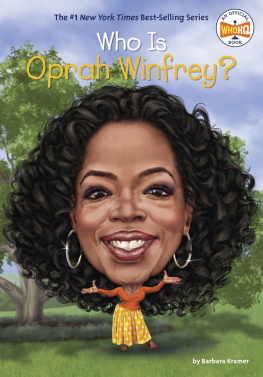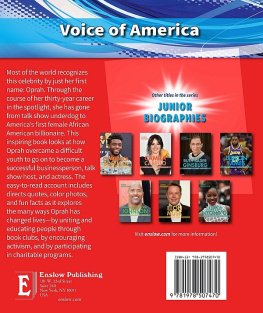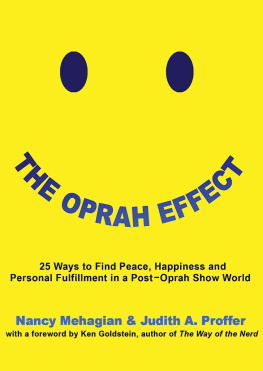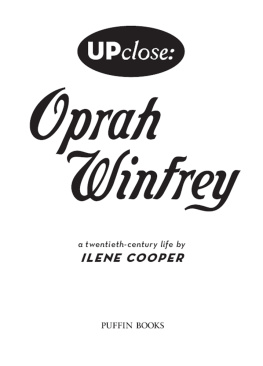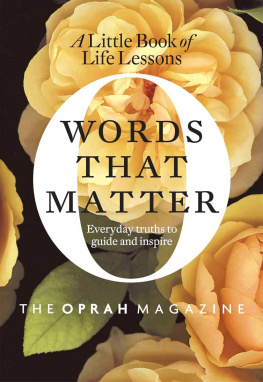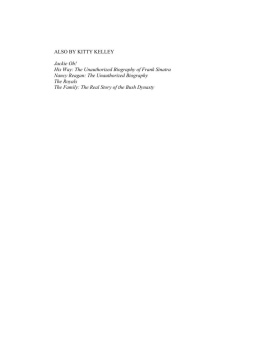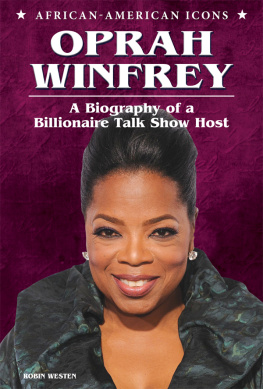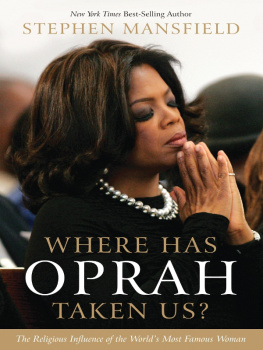First published 2008 by Paradigm Publishers
Published 2016 by Routledge
2 Park Square, Milton Park, Abingdon, Oxon OX14 4RN
711 Third Avenue, New York, NY 10017, USA
Routledge is an imprint of the Taylor & Francis Group, an informa business
Copyright 2008, Taylor & Francis.
All rights reserved. No part of this book may be reprinted or reproduced or utilised in any form or by any electronic, mechanical, or other means, now known or hereafter invented, including photocopying and recording, or in any information storage or retrieval system, without permission in writing from the publishers.
Notice:
Product or corporate names may be trademarks or registered trademarks, and are used only for identification and explanation without intent to infringe.
Library of Congress Cataloging-in-Publication Data
Peck, Janice.
The age of Oprah: cultural icon for the neoliberal era / Janice Peck.
p. cm.
Includes bibliographical references and index.
ISBN-13: 978-1-59451-468-5 (hardcover : alk. paper)
ISBN-13: 978-1-59451-469-2 (pbk : alk. paper)
1. Winfrey, OprahCriticism and interpretation. 2. Oprah Winfrey show.
I. Title.
PN1992.4.W56P43 2008
791.4502;8092dc22
2007046103
Designed and typeset by Straight Creek Bookmakers
ISBN 13 : 978-1-59451-468-5 (hbk)
ISBN 13 : 978-1-59451-469-2 (pbk)
In April 2006, Oprah Winfrey introduced an episode of her talk show thus: Today, a topic so taboo, so controversial, my producers had a hard time getting people to even talk about this (Oprah Winfrey Show, April 21, 2006). Given the genres reputation for sensationalism, we might assume the program was poised to reveal bizarre neuroses or sexual obsessions, were it not that the very ubiquity of TV talk shows has rendered such matters utterly mundane. Instead, the topic so taboo no one wanted to touch it was class in America.
Apparently inspired by a New York Times series from 2005 titled Class Matters,s the shows opening segment suggested a serious treatment of issues of class inequality: clips of experts citing the growing gap between rich and poor, shots of Hurricane Katrina victims crying for help, and Winfreys own statement that nearly 40 percent of all the countrys wealth is being held by the richest 1 percent. The fact that one of the guests was Robert Reich, U.S. secretary of labor under Bill Clinton, underscored the solemn tone as he spoke of declining manufacturing jobs, a shrinking middle class, mounting economic anxiety, and millions of Americans who are working very hard but still not making it (ibid.) in what some are now calling the new gilded age (Uchitelle 2007).
But even as Reich called into question the viability of the American dream, Winfrey reaffirmed it. She referred to a New York Times poll where 80 percent of those surveyed said they believe you can go from rags to riches in America; followed it up with a video clip of a young woman convinced she would acquire the big house, fantasy engagement ring, and nice cars because if you work hard, you can achieve anything; and finally declared herself not only a believer in the American dream of rags to riches but living proof of its veracity. Although Reich dutifully decreed his host a great model for America, he pressed on with his argument that success and failure are not simply matters of individual effort. Part of it is luck, he said, part of it is connection, part of it is education. Winfrey replied tersely, I dont believe in luck, Bob. I think luck is preparation meeting the moment of opportunity. I dont consider myself lucky at all. Nor, she added, did she consider Bill Gates lucky, even though Gates had told her he considers himself a fortunate man.
That a woman now worth $2.5 billion and ranked number 462 on Forbes list of world billionaires would be a cheerleader for the American dream is not terribly surprising (Goldman and Blakely 2007; Forbes 2004). That a member of the 1 percent of the population that possesses 40 percent of the nations wealth and that, thanks to George W. Bushs tax cuts, pays income, Medicare, and Social Security taxes at the same rate as people making $50,000 to $75,000 a year can say she does not believe in luck is unsettling (Herbert 2005d). That millions of people in that $50,000$75,000 bracket and below it agree with and strive to emulate her is what moved me to write this book.
Based on 2003 demographic data for Winfreys talk show and magazine audiences, I fall squarely within her target market (Mediamark 2003). I am female, like 77 percent of Oprah Winfrey Show viewers, and white, like 81 percent of them. Along with Winfrey and roughly 30 percent of her shows audience, I am a child of the baby boom. I am college educated. So is Winfrey, and 50 percent of her viewers and a whopping 78 percent of her magazine readers have attended and/or graduated college. Like nearly half of her talk show audience, I am employed, and like 61 percent, I am married. Along with nearly a quarter of the shows viewers and a third of the magazine readership, my household income is in the $75,000$149,000 range. I own a home (as do 78 percent of Winfreys viewers) valued at $150,000$499,000 (similar to 34 percent of them). By such measures, I could easily be among the legions who regularly tune in to The Oprah Winfrey Show and its cable companion, After the Show; who read O: The Oprah Magazine, O at Home, and Oprahs Book Club selections; who log on to Oprah.com, line up for tickets at Winfreys Personal Growth Summits, purchase her recommended favorite things, and subscribe to her philosophy that we are responsible for our lives.
Yet I am not a fan of Winfrey and never have been. I have, however, spent a great deal of time immersed in studying her wide-ranging enterprise and the vast domain of popular and scholarly treatments of her public persona, her media empire, and the Oprah brand. Employing what Douglas Kellner terms a diagnostic critique, which situates media texts and institutions within a social and historical context with an eye toward comprehending the defining characteristics, novelties, and conflicts of the contemporary era (Kellner 2003, 27), my goal in writing this book is to understand why and how Oprah Winfrey has become an icon for millions, and what that says about the times in which we live. In the process of tracing the history of her ascent from mere talk show host to cultural icon, and situating that journey in relation to the rise and triumph of neoliberalism, I hope also to contribute some knowledge to the vexed subject of class in America.
I would like to acknowledge a number of people who have helped sustain me over the course of this project. A series of graduate students assisted me in gathering and organizing the mountains of data: my thanks to Scott Webber, Helga Tawil Souri, Dinah Zeiger, Mark Finney, Kyle Kontour, and especially Madeleine Shufeldt-Esch, whose organizational skill and careful eye made the final stages of manuscript preparation much less painful. Several colleagues and friends provided support of varying kinds: engaging in discussions about theoretical issues that extend beyond but also inform this study; reading and critiquing portions of this research; offering practical advice about the publication process; and generally encouraging me to see the project through, even as it seemed to grow ever bigger and more complicated. My thanks and appreciation to Andrew Calabrese, Mark Andrejevic, Trysh Travis, Dan Schiller, Bob McChesney, Monica Emerich, and, especially, Rick Angell, whose knowledge of history never ceases to amaze me and whose careful reading encouraged me to dig deeper in my historical comprehension of mind cure. I am grateful to the University of Colorado, which supported the research with a sabbatical leave, a fellowship in the Center for the Humanities and the Arts, where I developed my early work on Oprahs Book Club, and an individual faculty growth grant. Parts of this research have been presented at meetings of the Euricomm Colloquium, the International Communication Association, and the Association for Education in Journalism and Mass Communication. My thanks to the various respondents and anonymous reviewers who have helped me identify weaknesses and thereby strengthen my work. I am particularly appreciative of the detailed and helpful comments provided by the anonymous reader of this manuscript. Jennifer Knerr, my editor at Paradigm, and David Paletz, editor of the Media and Power series, have been immensely supportive of this project and equally patient as I grappled with bringing it to a close. Finally, I wish to thank Bill Riordan, whose notion of redemption has always been materially and collectively based, for reminding me always to look for the dialectical intelligibility of any phenomenon. This book is for him.

